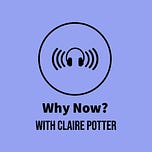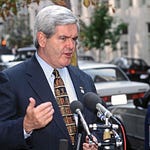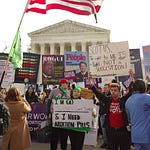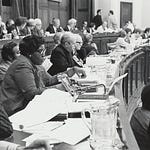
On May 18, 2023, Florida Governor and Republican presidential primary candidate Ron DeSantis signed House Bill 1557, perhaps the most significant retraction of LGBT+ rights in almost half a century. Officially called the Parental Rights in Education Act, critics nicknamed it the "Don't Say Gay" bill because it made any expression of identity beyond the gender binary or heterosexual family illegal in Florida schools in pre-K through the 8th grade. That includes a teacher publicly referring to a same-sex partner or acknowledging that there is such a thing as gay marriage—or that children in the classroom have two moms or two dads.
Books that help children think about these things in any way, like many books about race, have been removed from Florida's classrooms and to the back rooms of public libraries. Subsequent legislation has expanded these policies to cover more grades and more of the curriculum and restrict teachers' freedoms further. Sex education in Florida not only must prioritize abstinence and personal responsibility as the only methods of birth control, but the curriculum can also only refer to heterosexuality. All employees must use the pronouns appropriate to their sex at birth, effectively barring transgender teachers, administrators, and custodians from Florida's public schools.
But efforts to push queers out of public life aren't a recent development. As soon as LGBT+ people began to acquire the legal right not to be discriminated against in the 1970s, conservatives and religious groups attacked such legislation as conveying" special rights." They launched campaigns to rescind such laws, characterizing them as a response to an emergency: protecting children from homosexuals and homosexuality. In 1977, Christian singer Anita Bryant launched the successful "Save Our Children" campaign two months after Dade County, Florida, passed an anti-discrimination bill. The following year, Orange County legislator John Briggs put Proposition 6 on a statewide ballot, an initiative that would have banned gays and lesbians from teaching in California's public schools.
This all started back in the 1970s. A few months after Bryant’s campaign, California conservatives launched their own anti-gay initiative, one aimed at getting lesbian and gay teachers out of public schools. Known as the Briggs initiative, it failed because of a massive organizing effort by California's queer community and its supporters.
But as I learned from sociologist Arlene Stein's 2001 book, The Stranger Next Door: The Story of a Small Community's Battle Over Sex, Faith, and Civil Rights; Or, How the Right Divides Us (reissued by Beacon Press, 2022), even failed initiatives identify pockets of support, generally outside major cities, for attacking LGBT rights at the local level. Thus, in 1992, when a group of religious conservatives called the Oregon Citizens Alliance sponsored Measure 9, a ballot initiative that would strip lesbians and gays of civil rights protections, they lost. But they then re-launched their culture war in eight counties and three dozen towns where the proposal had succeeded.
One of these places was a small Oregon city that Stein calls Timbertown. In 1994, she traveled there from liberal Eugene, where she lived and worked, to understand the cleavages that anti-queer politics had created. How did a place where lesbians and gays lived openly and unobtrusively become a place where neighbors suddenly seemed like dangerous strangers? What were the larger economic, political, religious, and cultural forces at work? And how do anti-LGBT campaigns become a stalking horse for dividing us as a country?
You can download this podcast here or subscribe for free on Apple iTunes, Spotify, Google Podcasts, or Soundcloud. And if you liked this episode, please join us!
Program notes:
The opening clip is from Ron DeSantis’s statement about signing Florida’s “Don’t Say Gay” bill on May 18, 2023 (courtesy of NBC News.)
I discussed the extension of Florida’s “Don’t Say Gay” legislation, and its implications, here.
You can read a contenporary account of Anita Bryant’s “Save Our Children” campaign in New York Times reporter B. Drummond Ayres, Jr.’s “Miami Debate Over Rights of Homosexuals Directs Wide Attention to a National Issue,” (May 10,1977.)
You can learn more about the larger political context of Proposition 6, authored by John Briggs in 1977, in historian Natalia Mehlman Petrzela’s history of education in late 20th century California, Classroom Wars: Language, Sex, and the Making of Modern Political Culture (Oxford University Press, 2015.)
Juana Samayoa’s complete conversation with Lee Lee on her show “News Talk” about Lee’s activism on behalf of the 1977 Briggs amendment can be found on YouTube.
You can learn more about the Oregon Citizens Alliance in this June 1992 article from the Associated Press.
Arlene Stein is the author of a number of books, uncluding Unbound: Transgender Men and the Remaking of Identity (Vintage, 2019), Shameless: Sexual Dissidence in American Culture (NYU, 2006.)
We have addressed the deliberate creation of political division on the podcast before—interested listeners may also wish to listen to Episode 24: Against Government: A conversation with political scientists Amy Fried and Douglas Harris about their book, At War with Government: How Conservatives Weaponized Distrust from Goldwater to Trump (Columbia University Press, 2021.)
Claire and Arlene discuss the decline in traditional forms of church membership among many Christian believers, one that has continued since the 1990s: you can learn more about that social phenomenon here.
To see how right wing organizations explain their accusation that LGBT+ people are demanding special rights, visit the anti-abortion website Human Life International.
Arlene discusses the importance of coailition in defending LGBT+ rights. Timothy Stewart-Winter has written about such coalitions at the dawn of the gay lliberation movement in Queer Clout: Chicago and the Rise of Gay Politics (University of Pennsylvania, 2016.)













Share this post